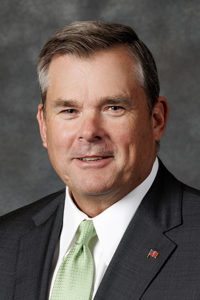Repeal of certain sales and use tax exemptions considered
The Revenue Committee heard testimony Feb. 1 on more than half a dozen proposals to broaden the state sales tax base in an effort to reduce local property tax collections.
Gov. Jim Pillen testified in support of the proposals, saying they are part of his plan to generate additional revenue to offset reductions in Nebraska’s high property taxes, which he said increased by $1.3 billion over the past six years.
Pillen said the sales tax package, in combination with a proposed cap on local government spending, is intended to reduce property tax collections by 40%, resulting in “permanent, long-lasting relief for all Nebraskans.” When considering the proposals, he said, elected officials must “sort through the noise” created by lobbying groups seeking to maintain the exemptions.
“We have to have the courage to have a significant attitudinal change to make sure we focus on what’s best for Nebraska,” Pillen said.

LB1308, introduced by Elkhorn Sen. R. Brad von Gillern, would eliminate a state sales and use tax exemption for repair or replacement parts for agricultural machinery and equipment. It also would impose sales and use tax on accounting services.
“I understand that the elimination of these exemptions is not popular,” von Gillern said. “But … they could become a small part of a partial solution to the property tax issues here in Nebraska.”
Dennis Swanson testified in opposition to the bill on behalf of the Iowa Nebraska Equipment Dealers Association. He said it would put Nebraska agricultural equipment dealers at a disadvantage to those in neighboring states that do not collect sales tax on replacement parts.
Also in opposition to LB1308 was Stacy Watson, who testified on behalf of the Nebraska Society of CPAs. She said taxing accounting services and other business inputs is considered bad tax policy because it leads to “tax pyramiding,” in which a good or service is taxed multiple times before it is purchased by a consumer.
LB1311, sponsored by Sen. Fred Meyer of St. Paul, would impose state sales and use tax on storage and moving services as well as certain animal speciality services, including veterinary services.
Jason Ball testified in opposition to the bill on behalf of the Lincoln Chamber of Commerce, Nebraska Chamber of Commerce and Industry and National Federation of Independent Business. He said LB1311 and the other bills under consideration would increase costs for businesses and families without reducing the total amount of taxes that Nebraskans pay.
“This kind of tax shift increases the tax burden on some Nebraskans to pay for reducing the tax burden on other Nebraskans,” Ball said.
LB1354, sponsored by Thurston Sen. Joni Albrecht, would impose a 7.5% tax on companies doing business in Nebraska if their gross advertising revenue exceeds $1 billion.
Sara Wilson testified in opposition to the bill on behalf of the Greater Omaha Chamber, the Nebraska Chamber of Commerce and Industry and the Lincoln Chamber of Commerce.
Although LB1354 is intended to tax large technology companies such as Google and Facebook, she said, they likely would pass along any increased costs to Nebraska businesses, many of which buy advertising from those companies.
Other bills considered by the committee were:
• LB1248, introduced by Sen. Kathleen Kauth of Omaha, which would impose state sales and use tax on candy and soft drinks as well as certain products made from hemp;
• LB1310, also sponsored by Albrecht, which would eliminate the sales and use tax exemption for Nebraska lottery tickets and exclude cash devices from a sales and use tax exemption;
• LB1319, introduced by Elkhorn Sen. Lou Ann Linehan, which would repeal a sales and use tax exemption related to data centers;
• LB1349, sponsored by Sen. Dave Murman of Glenvil, which would impose sales and use tax on the cleaning and repair of clothing and eliminate an exemption for admission to zoos and aquariums; and
• LB1345, introduced by Omaha Sen. Justin Wayne, which would impose sales and use tax on legal services performed in the furtherance of a business enterprise.
The committee took no immediate action on the proposals.


